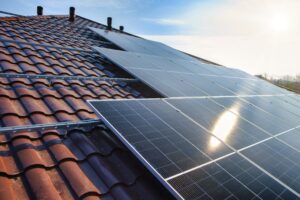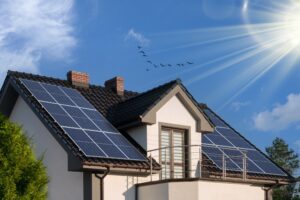Traditionally, UK homes have been powered by electricity generated by large, central power stations and distributed by the National Grid along transmission lines. However, more and more householders are becoming increasingly concerned about rising energy costs and the environmental damage associated with this system.
As such, savvy environmentally-friendly households are exploring ways to generate their own electricity on-site to lessen reliance on the power grid. Standard solar energy systems provide the main solution here.
Others consider taking their use of solar further by completely eliminating the need to rely on the grid. This is where off-grid solar energy systems come in.
You can learn all about what an off-grid solar system could mean for you in this post, including its environmental benefits, costs and savings, and whether off-grid systems are a realistic option for you.
What Is Solar Power?
Solar power is an infinite, renewable source of energy that produces no damaging greenhouse gas emissions. Besides reducing your carbon footprint, it also cuts energy bills. If you opt for off grid living, then your electricity bill would effectively be eradicated as your electricity would be entirely self-generated.
More than 1.5 million homeowners have already installed solar panels in the UK, but that is still only just over 4% of the housing stock across the entire country. A photovoltaic (PV) solar panel converts energy from the sun into power, providing households with the opportunity to produce some or all of the electricity requirements for their homes.
Solar panels are made from silicon or another semiconductor that produces an electric charge when exposed to tiny packets of energy – photons of sunlight. The resulting direct current (DC) is converted by a solar inverter into the alternating current (AC) needed to power homes and domestic appliances.
On-Grid Solar Vs Off-Grid Solar
There are two main types of solar systems: on-grid and off-grid. Both consist of solar panels and an inverter to convert DC to AC power.
Off-grid solar remains permanently disconnected from the grid. It therefore needs to work differently than an on-grid installation. With an on-grid system, the inverter sends energy into your home, which also connects to the grid via a meter.
With an off-grid system, the inverter also provides your home with power but is connected to a solar battery bank that stores solar energy for maximum power generation and the storage of excess energy. A power generator may also be used as a backup.
Off grid solar systems will need to be created using custom off grid solar kits designed to ensure you have everything – charge controller, battery backup, battery cables, etc.
- Create a Tailored Quote Based On Your Circumstances
- Takes Less Than 2 Minutes
- Fixed-Online Quotes

Benefits Of On-Grid Solar
On-grid solar energy systems – also known as grid-tied systems – provide a reliable power supply that reduces dependence on the National Grid. However, they remain connected to the grid, meaning they can draw energy from it in when their own solar power production isn’t sufficient for their needs.
Grid access can provide power when solar panels aren’t producing enough energy or when storage batteries need time to recharge. A grid-tied system also gives you the opportunity to get paid for electricity you feed back to the grid under the Smart Export Guarantee (SEG).
Benefits Of Off-Grid Solar
Off-grid solar systems run entirely independently and rely instead on solar battery storage. They provide a means of powering homes in remote locations not connected to the grid.
Off-grid solar can also be a solution for individuals and families who want to pursue a more environmentally-friendly off-grid life centred on self-sustainability and energy independence. It also frees households from electricity bills and gives them a greater degree of energy independence.
Living off-grid has become increasingly popular in the UK in recent years, with some estimates suggesting as many as 150,000 households are now embracing this way of living. With off-grid systems, you get energy independence and will still have electricity during periods where there is a power cut or outage.
- Create a Tailored Quote Based On Your Circumstances
- Takes Less Than 2 Minutes
- Fixed-Online Quotes

Crucial Role Of Battery Storage In Off-Grid Solar
Solar panels will likely produce more electricity than needed as they capture sunlight during the day. Storing this excess electricity in a solar battery is optional with an on-grid system, but it’s essential with off-grid solar.
Solar energy stored in a battery will be the only source of power when solar panels aren’t generating enough electricity during the hours of darkness, or when there’s heavy cloud cover that is overly affecting solar production levels. As with grid-tied systems, you can increase the efficiency of off-grid solar by expanding output and battery capacity as your energy needs grow.
Cost Of Going Solar
The cost of going solar has fallen significantly in recent years. Supply and installation of a 4kW system, for example, typically costs around £9,500.
However, off-grid solar systems can cost twice as much as a grid-tied installation. This is because they need more solar panels, a larger inverter, additional energy storage requirements, and possibly a generator.
Off-grid solar costs can also vary widely because of the variety in sizes, applications, and components.
Extra Savings With Off-Grid Solar
An on-grid solar energy system can cut household electricity bills by up to 70%. A major advantage of a completely off-the-grid solar energy system is that you won’t receive any electricity bills at all.
With a grid-tied system, the electricity company enforces standing charges even when you’re not using any of their energy. This can cost you about £200 a year just to
Solar Hybrid Systems
Solar hybrid energy systems give you full control over your power. They connect to the grid but also have batteries to store electricity. This means you can save the power your solar panels generate during the day and use it later.
Solar hybrid systems also come with an inverter that can channel AC power from the grid to your property when necessary.
Hybrid solar is more expensive owing to additional battery costs. But it reduces reliance on grid electricity during the daylight hours when it costs more. It does this by switching between grid power, solar power, and battery storage – so you have all options open to you here.
If the grid goes down because of a storm or technical glitches, you’ll still have electricity.
Disadvantages Of Reliance On The National Grid
There are two major disadvantages with traditional large-scale power stations and the national grid system.
With the drive towards net zero carbon emissions by 2050, concerns have intensified about power generation using fossil fuels. It contributes to the environmental pollution and greenhouse gas emissions that drive climate change.
A further problem is the high cost of energy, and electricity in particular. Although prices have somewhat stabilised compared to more recent price hikes, they’re likely to remain well above pre-energy crisis levels for some time.
These are the main reasons that have led to an increasing number of homeowners turning to solar power.
Government Decarbonisation Plans
The government’s net zero strategy relies largely on decarbonising the power sector by 2035. Measures centre on replacing gas-fired power stations with solar, wind, and nuclear power generation, and encouraging more UK households to improve the energy efficiency of their homes with solar, insulation, and other effective measures to reach their net zero greenhouse gas emissions target by 2050.
What’s beyond doubt are the immediate benefits for homeowners who install an on-grid or off-grid solar energy system.
Benefits Of Going Solar
Solar power is becoming increasingly popular with homeowners looking to save money on energy bills and reduce their carbon footprint. Most solar installations are on-grid systems that allow households to draw electricity from the grid in addition to their solar energy supply. However, some people choose to go solar as a means of achieving total independence from the grid.
Whichever your preference, you’ll be reducing your carbon footprint through use of solar technology. Substantially lower energy bills, or even eliminating your electricity bills entirely, mean your solar energy system will pay for itself over time, in terms of the savings you’ll be making, regardless of any rises in prices of grid electricity.
If you’d like to know more about the benefits of going solar, the team at leading national solar energy specialist Effective Home can help.
Contact us online or call 0333 003 0703. We can arrange a free home survey and a solar energy installation plan tailored to your specific needs.
- Create a Tailored Quote Based On Your Circumstances
- Takes Less Than 2 Minutes
- Fixed-Online Quotes




